

Learning analytics. Google, a ‘school official?’ This regulatory quirk can leave parents in the dark. The new Google logo is displayed at the Google headquarters on Sept. 2, 2015 in Mountain View, Calif. .
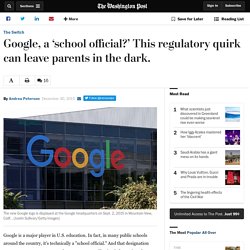
(Justin Sullivan/Getty Images) Google is a major player in U.S. education. In fact, in many public schools around the country, it's technically a "school official. " And that designation means parents may not get a chance to opt out of having information about their children shared with the online advertising giant. The combined allure of Google's free suite of productivity tools and cheap laptops that use the company's Web-based ChromeOS operating system have made Google's products a popular choice at schools around the country. “Data voor de student, niet over de student” Debate on Higher Education with students and teachers today in #TheHague with Minister @Jet_Bussemaker. How will @TNavracsicsEU guard EU students privacy in the e-learning environment? #studentsonHE @studentenbond #maagdenhuis @HetISO 1/n.
NotPICNIC on Twitter: "how will @TNavracsicsEU guard EU students privacy in the e-learning environment? #studentsonHE @studentenbond #maagdenhuis @HetISO 1/n" Van een dubbeltje een kwartje maken. Van klant naar product. Open data: Unlocking innovation and performance with liquid information. Open data—machine-readable information, particularly government data, that’s made available to others—has generated a great deal of excitement around the world for its potential to empower citizens, change how government works, and improve the delivery of public services.
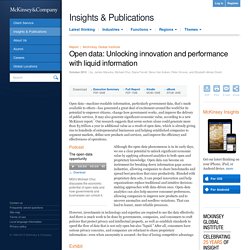
It may also generate significant economic value, according to a new McKinsey report. Our research suggests that seven sectors alone could generate more than $3 trillion a year in additional value as a result of open data, which is already giving rise to hundreds of entrepreneurial businesses and helping established companies to segment markets, define new products and services, and improve the efficiency and effectiveness of operations. Podcast The open-data opportunity DownloadMGI’s Michael Chui discusses the economic potential of open data and how governments and businesses can unlock it. Protecting student data in a digital world. Across industries, data and advanced analytics are being used to personalize products and services, generate more impact at lower cost, and improve the user experience.
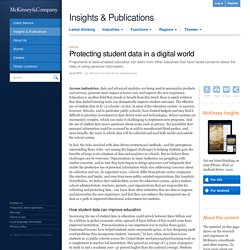
Education is another field that stands to benefit from this trend: there is much evidence that data-fueled learning tools can dramatically improve student outcomes. The effective use of student data in K–12 schools—in fact, in most of the education system—is nascent, however. Schools, and in particular public schools, have limited budgets and may find it difficult to prioritize investment in data-driven tools and technologies.
School systems are enormously complex, which can make it challenging to implement new programs. And the use of student data raises questions about issues such as privacy, the possibility that personal information could be accessed by or sold to unauthorized third parties, and, more broadly, the ways in which data will be collected and used both inside and outside the school system. Edward Snowden Explains How To Reclaim Your Privacy. LAST MONTH, I met Edward Snowden in a hotel in central Moscow, just blocks away from Red Square.
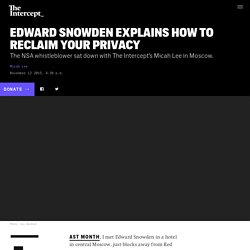
It was the first time we’d met in person; he first emailed me nearly two years earlier, and we eventually created an encrypted channel to journalists Laura Poitras and Glenn Greenwald, to whom Snowden would disclose overreaching mass surveillance by the National Security Agency and its British equivalent, GCHQ. This time around, Snowden’s anonymity was gone; the world knew who he was, much of what he’d leaked, and that he’d been living in exile in Moscow, where he’s been stranded ever since the State Department canceled his passport while he was en route to Latin America.
His situation was more stable, the threats against him a bit easier to predict. So I approached my 2015 Snowden meeting with less paranoia than was warranted in 2013, and with a little more attention to physical security, since this time our communications would not be confined to the internet. Our Seven Privacies: The Many Important Facets Of Privacy. When we talk of privacy online, it is easy to narrow the discussion to something that can be described as “anti-wiretapping”.
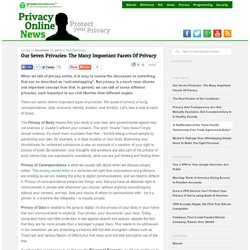
But privacy is a much more diverse and important concept than that. In general, we can talk of seven different privacies, each important to our civil liberties from different angles. There are seven distinct important types of privacies. Silicon Valley protecting yourPrivacy? ; "the_conspiracy" Deze bevlogen professor helpt je doorgronden wat privacy is. Privacy is dood in USA. Een demo cto big data visualisatie M. Datadrift - NOS. The United States Now Needs To Be Part of Any Privacy Threat ModelPrivacy Online News. When I was working in the European Parliament, there was one quote that stuck with me: “you’ll never see somebody’s own government listed among the threats to a customer’s privacy in their marketing material”.
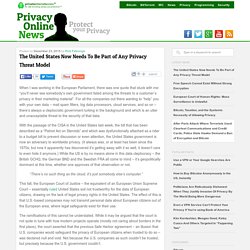
For all the companies out there wanting to “help” you with your own data – mail spam filters, big data processors, cloud services, and so on – there’s always a cleptocratic government lurking in the background and which is an utter and unacceptable threat to the security of that data. With the passage of the CISA in the United States last week, the bill that has been described as a “Patriot Act on Steroids” and which was dysfunctionally attached as a rider to a budget bill to prevent discussion or even attention, the United States government is now an adversary to worldwide privacy. (It always was, or at least has been since the 1970s, but now it apparently has discovered it’s getting away with it so well, it doesn’t care to even hide it anymore.)
Facebook and Dave Eggers's 'The Circle': Sharing Is Caring Is Sharing. The construction begs for comparison, and yet “The Circle” is no “1984.”
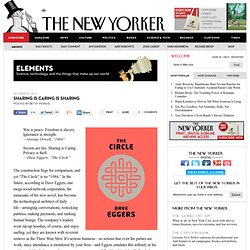
In the future, according to Dave Eggers, one mega social-network corporation, the namesake of his new novel, has become the technological architect of daily life—arranging conversations, restocking pantries, making payments, and ranking human beings. The company’s leaders wear zip-up hoodies, of course, and enjoy surfing, yet they are known with reverent remove as the Three Wise Men.
It’s serious business—so serious that even the parties are work, since attendance is monitored by your boss—and Eggers emulates this sobriety in his writing, which plods across the corporate campus resentfully. New hire Mae Holland, the novel’s protagonist, bounds forth into the communal ethos of her overlords, embracing her first assignment, answering e-mails that provide a “human experience” to small advertisers.
But even without the searing wit of “1984,” the book is capable of landing on point—when it’s at its most irksome. 'Privacy is diefstal' VOX: Bart Jacobs IRMA I Reveal My Attributes. Cursor 15 nl by redactie Cursor. Panopticon: illusie van privacy. Why Surveillance Will Be Abused, With Mathematical Certainty. People who defend today’s mass surveillance tend to claim that the collected data on everybody’s private communications and movements won’t be abused.
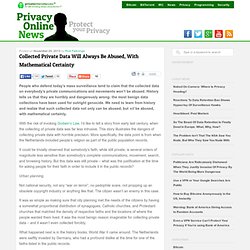
History tells us that they are horribly and dangerously wrong: the most benign data collections have been used for outright genocide. We need to learn from history and realize that such collected data not only can be abused, but will be abused, with mathematical certainty. With the risk of invoking Godwin’s Law, I’d like to tell a story from early last century, when the collecting of private data was far less intrusive. NHS England patient data 'uploaded to Google servers', Tory MP says. A prominent Tory MP on the powerful health select committee has questioned how the entire NHS hospital patient database for England was handed over to management consultants who uploaded it to Google servers based outside the UK.
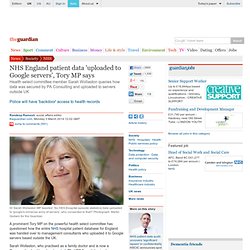
Sarah Wollaston, who practised as a family doctor and is now a Conservative backbencher, tweeted: "So HES [hospital episode statistics] data uploaded to 'google's immense army of servers', who consented to that? " The patient information had been obtained by PA Consulting, which claimed to have secured the "entire start-to-finish HES dataset across all three areas of collection – inpatient, outpatient and A&E". Education Week. Eerste virtuele collegegeld in Engeland.
InBloom's database. Your Child’s Data: Now Online. Crack investigative journalist Stephanie Simon has done it again.
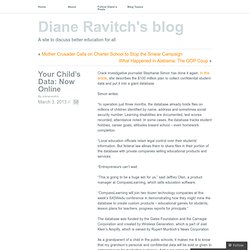
In this article, she describes the $100 million plan to collect confidential student data and put it into a giant database. Simon writes: “In operation just three months, the database already holds files on millions of children identified by name, address and sometimes social security number. Learning disabilities are documented, test scores recorded, attendance noted. In some cases, the database tracks student hobbies, career goals, attitudes toward school – even homework completion. “Local education officials retain legal control over their students’ information. “Entrepreneurs can’t wait. “This is going to be a huge win for us,” said Jeffrey Olen, a product manager at CompassLearning, which sells education software. The database was funded by the Gates Foundation and the Carnegie Corporation and created by Wireless Generation, which is part of Joel Klein’s Amplify, which is owned by Rupert Murdoch’s News Corporation. Opt out letter for parents who do NOT want their children's confidential info shared with private corporations, and our follow-up questions to NY State.
1. There is an article in today’s Reuters about the Gates-funded database called inBloomInc. that is collecting all the most private, sensitive, and confidential student data from New York and 8 other states, and plans to place it on a vulnerable “data cloud” and make it available to commercial vendors: “In operation just three months, the database already holds files on millions of children identified by name, address and sometimes social security number. Learning disabilities are documented, test scores recorded, attendance noted. In some cases, the database tracks student hobbies, career goals, attitudes toward school - even homework completion. K-12 student database jazzes tech startups, spooks parents. Aape : The biggest thing about... Big data and schools: Education nirvana or privacy nightmare? InBloom, a nonprofit start-up founded with funding from the Bill & Melinda Gates Foundation and Carnegie Corporation, is taking center stage and spreading around some significant funds as an official sponsor of the South by Southwest Education conference in Austin, Texas this week.
It hosted the official opening night party on Tuesday, is sponsoring a “networking lounge” with free coffee and snacks at the Hilton next to the convention center, and is debuting the first live demonstrations of its technology with representatives from pilot districts and states. Iwan Streichenberger. This Database Could Save Education In America.
Tuttle SVC: Explaining inBloom in Terms of a Digital Scale. I've got a turn of the century digital scale that estimates body fat percentage as well. If I want to track that over time, I have to manually write it down or enter it somewhere. The new models will communicate that wirelessly to my PC or phone, and they are integrating more data sources, like a pedometer. Student data portal raises privacy concerns. News Corp. Has a Tablet for Schools. On anonymity in science and on Twitter. A lot of people who I interact with on Twitter, and whose blogs I read, have chosen to tweet and write under pseudonyms. This puzzled me at first, but I have come to realize that there are a LOT of good reasons for people to mask their real identities online.
Anonymity allows people to express their opinions and relate their experiences without everything they say becoming part of their personal permanent record. It affords people who are marginalized or in tenuous positions a way to exist online without fear of retribution. Top Ed-Tech Trends of 2013: Data and Privacy. Part 7 of my Top 10 Ed-Tech Trends of 2013 series This is the third year in a row that I've chosen "data" as one of the "top trends" in ed-tech.
(See 2011, 2012) If you're looking for a sunnier view of data in education, read those. 2013, in my opinion, was pretty grim. Edward Snowden: Not TIME Person of the Year. It's apparently the end of the line for inBloom, but not our fight to protect student privacy. This morning, Stephanie Simon of Politico reports that indeed, after a long battle, the NY State Education Department has finally agreed to sever its relationship with inBloom and will ask them to delete all the student data already stored on its cloud.
This was the clear intent of the state budget bill approved on Monday, and marks the end of a long battle that started when the Regents approved this egregious contract in December 2011. ICT. Student ontdekt privacylek in HvA-intranet. Nieuwbakken student ontdekt privacylek HvA. Blackboard - Providence Equity Partners // Deutsche Bank. Studenten ontdekken ernstig datalek in Blackboard.
WTF: only access to primary University Facilities by fingerscan? .@FractieFront organiseerde een avond waar studenten discussieerde over de vingerafdrukscan. #TilburgU. @Fraktie Front ( download picture en scan / lees m'n vinger ) De rector verwacht dat computers in de toekomst ook empatisch en moreel begaafd zijn #diesnatalis #TilburgU. Pfft, hele opluchting dat @tilburgu_rector empatisch en moreel begaafd m'n zal laten scannen #diesnatalis #TilburgU. UReka ergert zich aan Blackboard en Menzis. Caracal - Univ Utrecht. Collegerama is het opnemen in Rich Media van colleges, symposium, presentaties, ect binnen de TU Delft. Perusall - RUG. Microsoft Lync. NicLbg : "Libraries should respect the... Students in Motion past privacyvoorwaarden aan na ophef. Radboud is watching you. RU is watching you.
VPRO tegenlicht Anoniem op het web. BarmakN : "@NirviShah: .@arneduncan says... TU Delta: dossier privacy. Iris Scans: Crushing Dissent Two Eyes at a Time. Anonieme cijfers studenten toch niet zo anoniem. Opzoeken wie welk cijfer heeft gehaald. UvA #privacyweek - sponsors facebook google palantir. UvA - psychologisch zorgplan ‘UvA Care’ tav gestresste PhD's ? Via SIS UvA // HvA 500.000 students (SIS Student Info System) 3 reasons why Amsterdam’s #privacyweek sponsorship was a fuckup. Avans heeft even toegang tot privételefoons studenten. Update: Koffie betalen met vingerafdruk. VU - 'end-point security- en monitoringtool' van Dtex. VU - Theo Bakker (draaideurtje promovendus & Senior Beleidsadviseur Studiesucces & Onderwijslogistiek VU) - Deloitte ( Student Analytics )
Brightspace - learning analytics - TU Delft - Radboud University. DUO. Celstraffen tussen de anderhalf en twee jaar voor DigiD-fraudeurs. Canvas. HvA en regels tav filmen na intro AVG (Algemene Verordening Gegevensbescherming) Ik heb Facebook van mijn mobiel verwijderd. Handel in gezondheidsdata moet verboden worden. Nieuwe digitale tentamensoftware overleeft vuurdoop - Vox magazine. Nationale Studenten Enquête. TU Delft - Lumesse // amazon. VU - DigiDoc // briefgeheim - alle inkomende post scannen digitaliseren ? VSNU - Elsevier = open access in ruil voor privacy - (meta)data ? Counter movements - awareness raisers.
'Tijd om na te denken over big data en privacy' Big data debat: privacy versus innovatie. Het Grote Big Data Debat NDT. Jan Willem Scholten. Graphic novella "Terms of Service; understanding our role in the world of Big Data" 'Vraag niet naar studie ouders' Chinese university has students under constant CCTV surveillance. Guizhou Province Orders Its Universities to Install Cameras in Classrooms.
Even more (not yet)